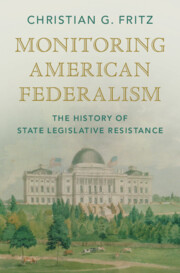Book contents
- Monitoring American Federalism
- Studies in Legal History
- Monitoring American Federalism
- Copyright page
- Dedication
- Contents
- Acknowledgments
- Introduction
- 1 The Riddle of Federalism and the Genesis of Interposition
- 2 Early State Use of Interposition: Testing the Powers of the New National Government
- 3 State Interposition and Debates over the Meaning of the Constitution
- 4 The Virginia and Kentucky Resolutions and Madison’s Report of 1800
- 5 State Interposition during the Jefferson and Madison Presidencies
- 6 State Challenges to the Supreme Court’s Control over Constitutional Interpretation
- 7 The Transformation of Interposition: The Theory of Nullification Emerges
- 8 State Interposition and Nullification on the Path to Secession
- 9 State Interposition during and after the Civil War
- 10 Modern Interposition by States and “Nullification”
- Abbreviations
- Notes
- Selected Short Titles
- Index
3 - State Interposition and Debates over the Meaning of the Constitution
Published online by Cambridge University Press: 05 January 2023
- Monitoring American Federalism
- Studies in Legal History
- Monitoring American Federalism
- Copyright page
- Dedication
- Contents
- Acknowledgments
- Introduction
- 1 The Riddle of Federalism and the Genesis of Interposition
- 2 Early State Use of Interposition: Testing the Powers of the New National Government
- 3 State Interposition and Debates over the Meaning of the Constitution
- 4 The Virginia and Kentucky Resolutions and Madison’s Report of 1800
- 5 State Interposition during the Jefferson and Madison Presidencies
- 6 State Challenges to the Supreme Court’s Control over Constitutional Interpretation
- 7 The Transformation of Interposition: The Theory of Nullification Emerges
- 8 State Interposition and Nullification on the Path to Secession
- 9 State Interposition during and after the Civil War
- 10 Modern Interposition by States and “Nullification”
- Abbreviations
- Notes
- Selected Short Titles
- Index
Summary
Two dominant constitutional issues in the 1790s illustrate the fluid nature of constitutional meaning in the early republic. One issue was whether the Constitution permitted individuals to sue states in federal court. The Supreme Court’s decision in Chisholm v. Georgia (1793) generated widespread state interposition to resist the Court’s broad interpretation of a constitutional clause and resulted in the Eleventh Amendment. A second constitutional issue generating interposition in 1796 was whether President Washington had exceeded his authority in negotiating the Jay Treaty with Great Britain. Federalists argued that the Constitution’s text clearly provided presidential authority while Republicans wanted Congress to speak for the sovereign people and have a vital role in assessing a treaty’s constitutionality. Both sides considered it important to understand the intent of those who drafted and ratified the Constitution and to employ that history in interpreting the document. Yet, this process of constitutional interpretation allowed inferences fromthe Constitution’s text, reliance on memory, and even thoughts about the framers’ intentions.
Keywords
- Type
- Chapter
- Information
- Monitoring American FederalismThe History of State Legislative Resistance, pp. 66 - 90Publisher: Cambridge University PressPrint publication year: 2023



